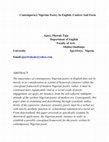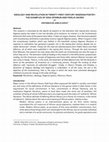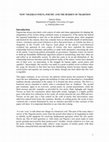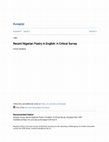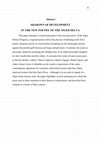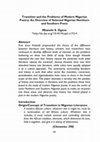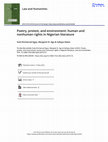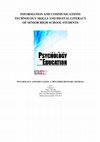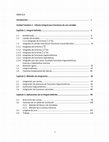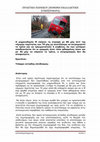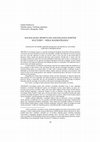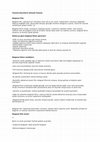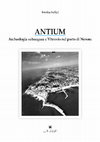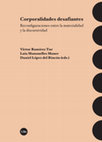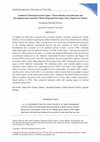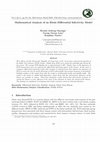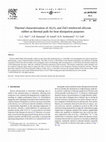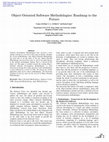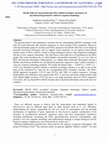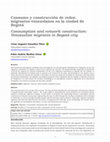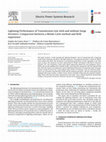PUSHING THE LIMITS: CHAMPIONING THE CAUSE OF THE MASSES IN OJAIDE’S THE FATE OF VULTURES AND OTHER POEMS
By
AGOFURE, Joyce Onoromhenre.
Department of English & Literary Studies,
Ahmadu Bello University Zaria. onorojoyce@gmail.com
Abstract
Tanure Ojaide is a renowned poet whose works imaginatively articulates the socio- political predicament of Nigeria. Ojaide has been concerned with the destiny of the Nigerian nation and the direction it has taken under various military and civilian regimes. His perception of Nigerian life is that its deprived people have been doomed to incarceration as a result of deprivation. Consequently, Ojaide’s collection of poetry centers on the issues of corruption, political ineptitude, bad governance and the subjugation of the under privileged masses in relation to the phenomenon of domination and exploitation. Although, these salient issues have been raised by other Nigerian poets, the consistency and urgency with which the poet Ojaide depicts them, makes his poetry oeuvre distinct. In this purview, the poetry Fate of Vultures and other poems depicts the curious polarity between the rich, poor and the impoverished which conveys the Nigerian condition as terminal. The Fate of Vultures and other poems is symptomatic of the magnitude to which Nigerian leaders have degenerated hence, the poetry demonstrates the many squalor and poverty in which majority of citizens continue to exist. To meaningfully explore the state of the masses in Ojaide’s The Fate of Vultures and other poems, the socialist realist theory will be apt as it scrutinizes the dictatorial setting in the society whereby one class governs while the other is governed. Along these lines, Literature in general and the Nigerian Modern poetry in particular, is a veritable channel for criticizing socio-economic and political concerns. This undertaking foregrounds the capability of the Nigerian poetry to create the necessary stimuli for consciousness and societal transformation.
Introduction
For Tanure Ojaide, it is the power of words that can uplift the hearts of people from disillusionment. Hence as a poet, he writes with urgency the need to detect faults in the national structure. Through the poetry mode, Ojaide sharpens the proletariat consciousness to see through the mischief of the privileged and deceitful leaders. Ojaide’s “Fate of Vultures and other Poems” is a collection of fifty-one (51) poems and it is divided into four major sections. Each of the section validates Ojaide’s perception of African leadership from its historical past to the post colonial era as a chronicle of brutality. His poetry portrays Nigerian politics as calamitous, harsh and ruthless. He also delineates the ills of Nigerian leaders by satirizing them. This is to expose the folly and vice of individuals and society at large with a view to reform the society.
In this context, this undertaking employs Socialist realism theory – “the depiction of the struggle of the working classes for power…. Socialist realism emphasizes the interpretation of real life problems in society, comprehensive and meaningful to the masses (Gray 65)”. For Markov (145), “Socialist realism is open for the accurate portrayal of real happenings in life. Its unique role reveals the pattern of development fundamental to society and the direction by which man might bring about its transformation”. Therefore, it is no secret in modern literature, “of the capitalist world, side to side with modernist trends, that socialist realism represents a phenomenon of crucial importance for tackling any problem that may arise today (Markov 146)”.
Thus, socialist realism is directed towards a struggle against survivals of the “old world and its pernicious influences” (Biztray 65). Consequently, in the face of betrayal by the ruling elites in Nigeria, Tanure Ojaide as a socialist realist makes significant the issues affecting the common people. In the collection Fate of Vultures and other poems Ojaide’s compulsion over the tragedy that Nigeria has become since the 1960’s civil strife registers the rumblings of the past and present. Like many of his counterparts he suffers the fate that all poets must carry in similar socio-political contexts- tortured by deeds which belittle and denigrates humanity. It is an inner quest by the poet to conquer the turbulence of his world, in his own country Nigeria. Socialist realism is open for the accurate portrayal of real happenings in life. Its unique role reveals the pattern of development fundamental to society and the direction by which man might bring about its transformation.
In The Fate of Vultures (1990), Ojaide presents a state of inhuman domination since the post war era by successive tyrants. As a socialist realist, he pegs his tent with the oppressed and challenges every ruler that promotes suppression of the Nigerian people. This he ably does through the use of ironies and satirical strings. To this effect, Tijan Sallah argues that “Ojaide’s artistry can be surmised as pivoting around the themes of protestation against political and economic tyranny with a deep sense of rootedness from his Delta region”(28). His poems are platforms through which the poet confronts, and lampoons political charlatanism of the Nigerian rulers. In the first section of the poem “The Music of Pain” for example the poet declares that his poems are songs that address and correct societal ills. In other words, his poems chart the course of the people in order to excruciate them from the despondency that fleeces them. Thus he laments:
…shame
chiefs of selfish rule
they are fine filed matchets
in the hand of the threatened!
They are a swarm of mystery bees
haunting robbers of the proud
heritage…listen to my song
the music of communal pain (2)
The poet in the above stanza captures dishonourable leaders who like robbers are not known for civilized encounters rather they invade citizens with ruthlessness through “selfish rule”. These plunders of “proud heritage” are a threat to peace in the land thus the poet metaphorically describes the leaders as “mystery bees” and “chiefs of selfish rule”. Comparably, the poem “When Soldiers are diplomats”, describes the retrogressive characters of the Nigerian soldiers who are diplomats in power. Using animal images, Ojaide symbolically describes these soldiers and rulers as “bed bugs” and “Leopard fangs” to illuminates their parasitic dispositions.
For Ojaide, the indecent behaviours of the military rulers are easily exhibited no matter how they try to conceal them. Hence, Ojaide describes military rule, as “savage sophisticraft of diplomatic soldiering”. The poet forewarns the masses of these despicable leaders who care little about the nation and masses as such deserve the wrath of “Aridon” the Urhobo god of memory as the poet cries out:
O Aridon, bring back my wealth
from rogue vaults…
blaze an ash trail to the hands that
buried mountains in their bowels
lifted crates of cash in their closets (11).
In the Fate of Vultures, the poet Ojaide uses satiric strings to condemn the few hands plundering the country’s wealth. As well, the poet directs poetic venom at politicians who have lavished the nation’s resources these he regards as political juggernauts. The poet bemoans: …the chief and his council /… gamboling in the vein of fortune / range chickens, they consume and scatter…(11). From the aforementioned lines, Ojaide symbolically illustrates a painful scenario of the national condition. The government as “a flock of flukes” (11) displays its prodigality as they lavish the people’s resources. This insensitivity exposes the indignity of Nigerian rulers. Images such as “rogue vaults” “buried mountains”; “crates of cash” give the picture of looting, embezzling and mismanagement.
In the poem “Compatriots” the poet satirizes the erosion of progressive will among the advantaged few. The poet grieves the condition where a small number of squanderers have “incapacitated the saviour totem and razed its wing hold” (13). These political rulers have achieved nothing in developing the country instead:
they cashed on the absence of stars…
they cashed on the eclipse of the sun
to change the love anthem into a
rampage drum (13)
In the above stanza, the poet decries how Nigerian rulers try to usurp every opportunity for their own nefarious purpose and strive to elongate their tenure using charms. The poet explains further in the poem “players” that Nigerian leaders are “born actors”. This provides the reader with a concrete detail of the political landscape. The deceitful nature of Nigerian leaders that have paraded the Nigerian socio-political arena is enlivened for all to behold:
…you will pour all the stinking insults on him
a failure even by the barbaric standard of a king,
but the leading actor won’t mind
since he knows that like burs on a fowl
they will fall off when he stretches himself… (15)
In “Players”, Tanure Ojaide condemns rulers noted for their actor-player style. Their pretentious smile is what the poet calls “toothsome pearls” with which they hoodwink the people in their despicable performance. In the poem “The Arrow Flight”, Ojaide lampoons Nigerian political leaders using terms like “shylock”, “the hare over the crest fallen cock”, and “The lion over the Goat”. The Nigerian political elites are not perplexed about the conditions of the downtrodden populace. Their selfish creed for the masses has further impoverished the masses. This brutality the poet recreates:
They command the world to attention
riding through waves of tears in a vain lift,
they only have what it takes to seduce hungry patients
place boo and fufu-ful promises of well being (16)
Using epithets such as “honey cake”, “ashen loop”, gap-toothed shine”, in the poem Ojaide portrays the activities of politicians. These politicians have a way of grabbing whatever they want. To deceive the commoners, they give crumbs to grab more than they need. For their crafty behaviour, Ojaide informs the people to do to these cheats “what you’ll do to a cobra on your door step”. Ojaide, wants these corrupt rulers to be punished as this portraiture will put a stop to their lootings. In addition, misplaced value rails Ojaide’s collection of poems. The greed for materialism by the ruling elites fills his poem. This motive is geared towards the need to resuscitate the nation Nigeria. On this ground, Tijan Sallah bewails “the withering away of classical public services, where the pursuit of the public goods is perceived not only as selfishly remunerative… but has given birth to the stench of that sinister fore-private greed” (37).
As well, the poem “murderers” mirrors aptly the cunning political elites that torture the people they rule. These deceptive rulers flourish on the “hope” of the masses with toothy and ready smile. They are compared to a “mouse” since they continually entrap the people with their dubious demeanour believing their victims do not know the truth from the lie. Ojaide warns of the two sided leaders thus:
And whenever one of them smiles
look between the teeth,
there the mouse busy tearing your flesh
and blowing balm unto the wound (37)
The poem titled “Where Everybody is King” is a touch stone that realistically displays the contemporary condition of the nation Nigeria and the Niger Delta region. The poet leads everyone to come to witness in “Agbara”: …where everybody is king / and nobody cares to acknowledge age / since power doesn’t come from wisdom (58). The situation the poet sketches is terrible. The recognition and respect of age is scorned and trampled upon in the poem. The poem ‘Agbara’ epitomizes a society nose diving towards a traditional abyss. The poem ridicules a society bereft of progress and development “where everybody is as bloated as wind filled bag”. A place like Agbara reflects a state of lawlessness where militants challenge the might of those in power because of the plundering and devastation of their environment. The poet says:
Of course rivalry
has smeared the town
with a bloody face
or sees himself as really great
in the presence of others…(58)
Out of chagrin for the leaders who have fleeced the people, young militants have become restive against the privileged few as such “no king is safe anymore” (58). The poet states further that:
In Agbara nobody wakes to work
everybody washes his mouth with gin
and sits at home on a floor mat of a throne.
Are you surprised at kwashiokored princes
and princesses. Come to Agbara where everybody
prides himself greater than the rest of the world… (59).
The penury and poverty the “Agbara” people inhabit make them swim in bloodletting rivalries. Tafioye laments thus: “the satire is indicative of the social malaise in Nigeria. Most people are tattered and they wear it… the Delta has thus become the agent of self revelation in a melancholic and sardonic, social reveries and revelry”(30). Although, the poet makes uncomfortable comments about “Agbara”, a microcosm of the nation Nigeria, he intends to mitigate an appalling situation. Ojaide informs his brothers and sisters in the Delta region and in Nigeria at large to live up to expectation. The need for hard work in a world of class distinction is crucial. With poetic intensity therefore, he radiates the truncated dreams and aspirations of the people.
In “The Banner of the Future”, the poet Ojaide, registers a tone of disappointment that occurred just after Nigeria’s independence. The jubilant mood of the people is ravaged as political vulgarity and gross irresponsibility become the anthem. The masses bear the brunt of economic misery and political strangulation. The masses, therefore, lost faith and trust such that: Soon / whoever wants to live / will have to fly farther / than the fatherland (69). Ojaide fathoms no virtue in the defamed role of political rulers in the nation’s body politics. When those committed with the responsibility of public patrimony dissipate it, the society is forced to swallow the pills of frustration. Ojaide therefore mirrors the ailing societal condition and uses his poetry to poke shafts at Nigerian politicians and soldiers for their inhuman acts. Also, in the poem designated “Questions of State”, the poet questions the state of things in Nigeria during the civil war. This he refers to as “dog days… and Communion of tears”. The image of “dog days” depicts unrest. The poet captures the details of the national scene. During the seemingly money galore period of oil boom, the nation had enough resources to shoulder her internal responsibilities but a few hands converted the people’s wealth to their personal accounts in the name of the people they govern syndrome. The poet reveals:
With the mass conversion
to the all of you faith
will he not keep his vision
to himself in the closet
and damn the world…(94).
From the above stanza, the Nigerian rulers can be likened to tortoise the trickster in its parasitic attitude to continuously amass wealth at the detriment of others hence: … to himself in the closet / and damn the world…. The poet shows the austere condition under which the masses have lived since Nigerian independence. In the real sense, the condition portrayed by the poet is a sign of the callous indifference of Nigerian leaders who have turned “monsters” to the quandary of the ordinary citizenry. That is why the poem explains: whoever wants to live will have to fly farther than the fatherland (69). The situation is so strangulating, that the populace gasp for survival as the poet declares there’s hardly space to breathe (69).
Akintola Jimoh, in one of his articles observes that “one cannot peep through the pages of Nigerian history without taking in a heavy breath. It is a bizarre story of purposelessness and mismanagement (28)”. Life for all and sundry is miserable except for political bureaucrats who are referred to as the “Oracle profiteering in tears and howl” (94). In a restrained manner, Ojaide feels to his bone marrow the unfortunate political circumstances of the nation as the political messiah that will deliver the proletariats from annihilation is yet to be born. Through The Fate of Vultures and other Poems therefore, the poet Ojaide strives to remind his fellowmen of the disappointments that envelope the citizen and advocate for visionary changes in the Nigerian society.
The Politics of Class Struggle
According to Udenta O. Udenta in Revolutionary Aesthetics and the African Literary Process “Art as a force of production exists only in the context of the negation of existing contradictory reality of class society by rising above its impediments, by going beyond its ideology and developing a system, qualitatively new, that challenges it (55)”. Along these lines, Udenta, observes that art is in a way “predisposed to challenge the existing order, that exploit the unprivileged few down the societal stratum (55)”.
In line with the above assertion, Ojaide’s The Fate of Vultures and Other Poems, is focused largely on the politics of class struggle, corruption, oppression and political elitism. Since independence various political leadership in Nigeria have perfected the same posture of political chicanery so much so that the ordinary man’s struggle persists. The extent to which these advocates of capitalism exploit the resources of the poor is heartless. Vague theories of modernization and transformation of present day capitalization, which maintain that the scientific and technological revolution will render class struggle and socialist revolution unnecessary, have been proved wrong. This is evident since the works by socialist realist poets continue to expose the prevailing issues in contemporary societies. To acquiesce with Sertsova et al, he states: “committed artist and poets portray crises phenomenon, unprecedented in scope and intensity, affect all spheres in bourgeois society today- the price rise, politics ideology, runaway inflation, currency upheavals, declines in production, growing unemployment…and the crises of bourgeoisies democracy and culture have set off a new powerful tide of class battles”(6).
Ojaide projects class struggle through the rural peasantry, urban poor and the bourgeoisies. The Fate of Vultures and other Poems (1984) testifies Ojaide’s belief that as a result of class struggle, the indecent ways of the political elites will be scourged. He conveys:
Pity the fate of flash millionaires
if they are not hurled into jail
they live in the prison houses
of their crimes and wives…(12)
In his subtle revolutionary style, Ojaide uses animal images to strengthen the satiric crux of his poems. He portrays this in the poem “This arrow flight”.
May this arrow flight pick wings from the angry winds
and pluck the spiders in the center the tortoise in his bone furnished den…and no Ogiso, a plagued dynasty of boasts should be allowed to live a full life (16-17).
Drawing a satiric portrait of political leadership along with class struggle, Ojaide describes the oppressive and exploitative ways of the Nigerian rulers using images of “Spider”, the tortoise and “Ogiso”. The poet conjures in the “arrow flight” an image of the downtrodden to confront the forces of repression. The poet in the forefront of the war against the oppressor is energized to ensure that these exploiters are chastised. In his depiction of class struggle, Ojaide uses powerful animal persona against the weak ones. For instance:
And for them, there’s only one advantage
the hare’s over the crest fallen cock
the lions over the goat
and they exact it to the last breath…(16)
Furthermore, the poet invigorates his audience to break loose from continuous impoverishment by the political class. He empowers the exploited to rise up to the challenge and defend their situation. Similarly, in the poem “The Man in a Borrowed Frock” Ojaide says to the masses:
worse than a goat, shameless
more voracious than a tortoise
what better thing
than make him taste raw
the steel shaft of your mind?
Never let him go without a
savage kick (45)
For the Nigerian leaders who are “more voracious than a tortoise” their greed must be uncovered. The politician who turns blind to the peoples need deserves to taste “The steel shaft” of the peoples mind. The poet challenges the people to action as he encourages them to assail their assailers.
for how long will eyes stand bull shirt
for how long will they watch rather
than break up the offensive dance of
those sworn to break the rules? (p20)
In his revolutionary bid, Ojaide uses the power of his words to attack political cannibals in Nigeria. The poet’s eagerness for the re-ordering of the nation’s ailing situation makes him repeatedly cry out “for how long”. The complaints in the above poem reflect the depths of the poet’s frustration and the state of mind of the people. In the poem titled “The toast”, the poet acknowledges his preparedness to confront the “hyenas” in their hideouts of affluence and misappropriation of resources. The rulers as cheats must pay for their misdemeanor. This the poet recreates in the following lines:
I will oblige
when asked to propose a toast
to the health of the hyena
I will do it with the purpled lip
of a victim with a compliment
coated curses
and with sleeve sheeted daggers (p86).
As a social crusader, Ojaide’s ultimate purpose is to effect a change in the social attitude and bring about genuine transformation in the society through satirical jibes. The optimistic tone of the poet sustains hope for a better future as soon as the misguided rulers are “floored” and “bruised”. Ojaide envisages freedom for the downtrodden when those who “gloat over seeing others wounded and down” will receive their own repercussion. To picture this, Ojaide confident about the future in “The Patience of Memory” says: Whatever is lost to the future/will see light (92). From these lines, Ojaide’s declarations, avails the circumstances of the people. The poet’s pessimistic mood comes alive with optimism as he declares in faith:
I pledge not only support
I give my life,
if that’s what it takes to revive
the land…(p21)
Various Nigerian political officers who at one time steered the nation’s affairs stole and stashed away billions in foreign accounts. The fury of the whole drama is that these looters and ignominious rulers still trot the nation campaigning to be re-elected to the position they once plundered. Ojaide laments: For how long will one survive/ ducking monstrous feet,
sneezing from allergic inhalation…? (71). As a social crusader, Ojaide’s ultimate purpose is to effect a change in the social attitude and bring about genuine transformation in the society through satirical jibes. The optimistic tone of the poet sustains hope for a better future as soon as the misguided rulers are “floored” and “bruised”. Ojaide envisages freedom for the downtrodden when those who “gloat over seeing others wounded and down” will receive their own repercussion.
The decadence and sterility of contemporary socio-political set up in Nigeria is vividly captured by the poet. Like his counterparts, he focuses on the vision of freedom by raising the consciousness of the proletariats. He wishes for a society where citizens are not to be divided into masters and servants, exploiters and the exploited, the hungry and the well fed, the slaves and the slave users. Instead, Ojaide just like Madunagu hopes for a society where “the principles of equal pay for equal work… is firmly established…” by those who preside over the structure of oppression which Nigerian working people today, find themselves” (16).
Conclusion
The image which emerges from the examination of Ojaide’s collection of poems- The Fate of Vultures and other poems affirms a society which possesses all the potentials for positive development but is subjected to negative objectives due to selfishness, greed, mismanagement and societal deficiencies. Tanure Ojaide’s poetry under study, pinpoints the vicissitudes of everyday Nigerian caught in the labyrinth of a slimy future. His poetry shows the Nigerian rulers’ cynical attitude to the many impoverished Nigerians they govern - a lucid imagination of contemporary Nigerian society. Ojaide conveys the reality that the less privileged Nigerians have since been strangulated by different regimes in Nigeria whether military or civilian rule. Thus Ojaide’s preoccupation illustrate through his literary work that change is possible through reflections on societal issues prevalent in Nigeria
WORKS CITED
Aiyejina, Funso. “Recent Nigerian Poetry in English: An Alternative Tradition.”
Perspectives on Nigerian Literature. Ed. Yemi Ogunbiyi. Vol. 1. Lagos: Guardian Books, 1988. Print.
Bisztray, George, Marxist Models of Literary Reality. New York: Columbia University Press, 1978.
Gray, Martin (1994), A Dictionary of Literary Terms. London: Longman York P.
Jenkwe, Toryima. “Satire as a Tool for Social Reconstruction in Osundare’s Poetry.”
The Poetry and Poetics of Niyi Osundare. Ed. Ngumoha Emma. Enugu: Jemezie Associates, 2002. Print.
Jimoh, Akintola. “Independence without Freedom”. Guardian, 1 Oct. 1988. Print.
Lenin, V.I., The Importance of Gold Now And After the Complete Victory of Socialism.
Collected Works, Vol. 33. 1973. Print.
Madunagu, Edwin. “The Society of the Future”. Guardian 12 Dec. 1990. Print.
Markov, Dmitry, Socialist Literatures: Problems of Development. Moscow: Raduga
Publishers,1984.
Ojaide, Tanure. The Fate of Vultures and Other Poems. Lagos: Malt house Press,1991. Print
…, Poetic Imagination in Black Africa: Essays on African Poetry. Durham: N.C. Carolina
Academic P, 1996. Print.
Olafioye, Tayo. The Poetry of Tanure Ojaide: A Critical Appraisal. Ibadan: Malt house Press, 2000. Print.
Sallah, Tijani. “The Eagle’s Vision: The Poetry of Tanure Ojaide” Research in African Literature. Vol. 26. No 1. 1995, Print.
Sertsova, Anna, Valentina Shishkina and Lyudmila Yakovleva. ABC OF Social and Political Knowledge: What is Revolution? Moscow: Progress Publishers, 1986. Print.
Udenta, Udenta. Revolutionary Aesthetics and the African Literary Process. Enugu: Fourth
Dimension Publishing Co., 1993. Print.
PAGE \* MERGEFORMAT 16
 Joyce O N O R O M H E N R E Agofure
Joyce O N O R O M H E N R E Agofure


